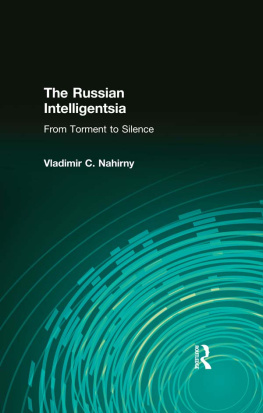THE TORMENT OF SECRECY
EDWARD A. SHILS

The
TORMENT
of
SECRECY
THE BACKGROUND AND CONSEQUENCES
OF AMERICAN SECURITY POLICIES
With an Introduction by Daniel P. Moynihan

THE TORMENT OF SECRECY. Copyright 1956 by The Free Press. Introduction copyright 1996 by Daniel P. Moynihan. This book was first published in 1956 and is here reprinted by arrangement with the Estate of Edward A. Shils.
First ELEPHANT PAPERBACK edition published 1996 by Ivan R. Dee, Inc., 1332 North Halsted Street, Chicago 60622. Manufactured in the United States of America and printed on acid-free paper.
Library of Congress Cataloging-in-Publication Data:
Shils, Edward Albert, 1911
The torment of secrecy : the background and consequences of American security policies / Edward A. Shils. Introduction by Daniel P. Moynihan.
p. cm.
Originally published: Glencoe, Ill. : Free Press, 1956.
Elephant paperbacks.
ISBN 1-56663-105-X
1. Internal securityUnited States. 2. CommunismUnited States. 3. United StatesPolitics and government19331953. I. Title.
E743.5.S48 1996
327.73dc20
95-50421
To
ROBERT HUTCHINS
and
MICHAEL POLANYI
INTRODUCTION
Daniel P. Moynihan
I WRITE FROM A CORNER ROOM on the third floor of the United States Capitol. It is a fine, sun-splashed November morning. Outside, Olmsteds park is a deep, shining green, sprinkled with sycamore leaves now descending with a kind of fruitfulness that speaks of harvest time. It is strangely quiet, but then this is not strange, for the United States governmentthis being the eleventh time in fourteen yearshas closed down for lack of funds.
This mornings Washington Post continues the account of what may be one cause of this temporary embarrassment. Or yet again may not. It would appear that some while ago an American spy in the employ of the CIAthat is, the Central Intelligence Agencyhad been turned, as spies say, by the Soviet KGB (Komitet Gosudarstvennoi Bezopasnosti) and had told his new masters the names of a dozen or so Soviet citizens who had been turned by the Central Intelligence Agency and were providing us with secrets of Soviet defense policies and plans. These Soviets had been rounded up and for the most part executed.
It happens I encountered one such loss. I was in Moscow in 1987 primarily for the purpose of looking over our vast new embassy complex there. It was designed as an elegant London square by Skidmore Owings and Merrill, with a towering embassy building on the side. But it seemed the Soviets had inserted some bugs into the steel beams used in the chancery, and thus we were required to remain in the Czarist-era firetrap on Tchaikovsky Street we had occupied since 1953. My advice was to move to the new buildings, put a bubble in the basketball court so the ambassador could talk to his staff on serious matters, and let the Soviets listen in to the rest. I suggested that the subsequent eavesdropping, transcribing, translating, distributing, and debating would cost them the equivalent of a battleship a year, which, even if no one needed battleships anymore, would deserve them right. Needless to say, the State Department decided instead to raze the site and start over again.
Inside the old embassy a distraught but determined CIA station chief had locked himself up in a bubble the size of two broom closets and tried to think his way through his problem. An asset of inestimable value had disappeared. We had enough remaining sources to know the man had been shot. Who had informed? Some marines had been dating local girls. Were they just local girls? Had a code been broken? Had telephones been intercepted? Had some attach enjoyed too much vodka at a reception? Every possible explanation, save that of Mr. Aldrich H. Amess red Jaguar tooling around the tonier suburbs of Northern Virginia.
There was worse to come. In October 1995 it came out that the Soviets, learning of our agents within their ranks, replaced them with their own agents. These agents now began feeding reports to the Central Intelligence Agency which the Agency in turn passed on to the White House and the Pentagon, all or mostly allit is not yet settled, probably never will beto the effect that the Soviet colossus was growing in economic strength and military might and spoiling for a confrontation with the decadent and divided West. After a while, or so we read (I could find out readily enough, but were I to do so, I would be sworn to secrecy and, among other things, would not be writing this Introduction), Agency analysts began to suspect that the Soviet sources were tainted. But they chose not to tell this to the president or the secretary of defense.
This revelation was accompanied by much inside Washington speculation that the tainted Soviet secrets had so alarmed the White House and the Pentagon that we had commenced a much greater arms buildup than was needed. Indeed, we brought back into service those splendid Iowa-class battleships of World War II. We would not flag or fail. We would go on to the end. We would fight them on the beaches, we would fight in the fields and in the streets, we would fight in the hills; we would never surrender. The good news this morning, to quote a succinct summary by Walter Pincus of the Post, is that we would have done it anyway.
A Defense Department review has been unable so far to find any policy or weapon purchase decision that in and of itself was shaped by tainted Soviet intelligence provided to the Pentagon by the CIA between 1986 and 1994, according to sources familiar with the study.
The review was launched two weeks ago after release of a worst-case assessment that billions of dollars may have been spent by the Defense Department based on highly sensitive documents and data that may have been supplied as part of a Soviet disinformation campaign.
The material received from Moscow sources was sent by the CIA to the Pentagon without notice of its suspicious origins, an action that led CIA Director John M. Deutch to reprimand seven retired and active CIA officers.
The material may have been planted by the KGB as a result of work for Moscow by confessed spy Aldrich H. Ames. Richard L. Haver, who headed the damage assessment team that looked into the impact of Amess espionage, told a luncheon group yesterday that he does not believe any direct effect on decisionmaking came from the documents received from agents recruited by the CIA and believed to have been under Moscows control.
The tainted information was blended in with all the other streams of information and did not damage any weapons acquisition or design in any specific degree, a source described Haver as telling a National Military Intelligence Association luncheon at Bolling Air Force Base.
Note well that this report came from a source, which is to say that the consequences of the mishandling of secrets was itself secret.
Gentle reader, be not perplexed. You have not entered a hall of mirrors; you are not lost in a cave of winds. You have encountered nothing more commonplace than bureaucracy. Mind, I said dont be perplexed; I didnt say, dont be depressed. What we observe, in Max Webers terms, is the principle of rationalization at work, and of its central institutional response, the modern bureaucratic system. Where once a president might gather information on foreign affairs from the occasional diplomatic dispatch from an embassy abroadThomas Jefferson, as secretary of state, once noted that it had been a year since hed heard from our envoy in Madrid, expressing the hope that not another year would pass before he would have that pleasureor from travelers, newspapers, and stock markets and the like, now there were large, formal institutions created specifically for that purpose. In the case of the Central Intelligence Agency, an organization two or three times the size of the Department of State, it had the all-important assignment of producing for the president each and every morning the National Intelligence Daily, or NID as usage has it. This information, of course, is SECRET, rather, TOP SECRET, at minimum. There are higher classifications, but they themselves are SECRET. Weber laid this out in
Next page





